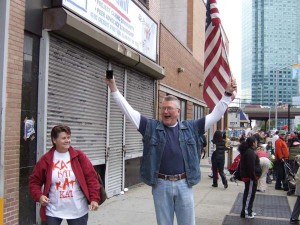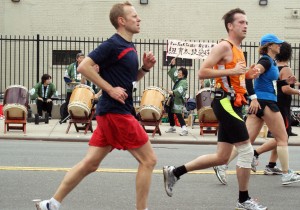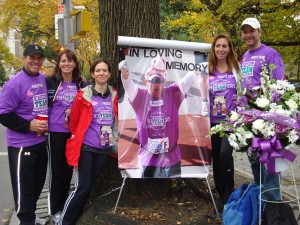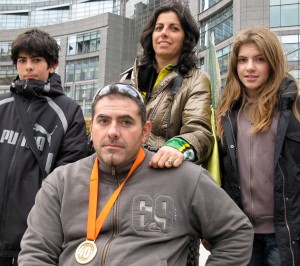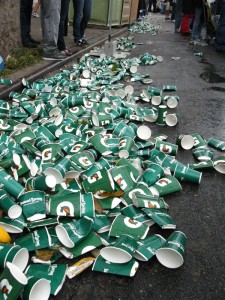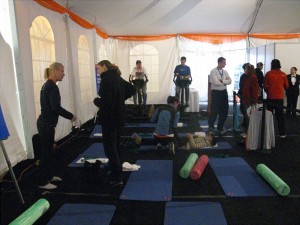A CHILLY START
STATEN ISLAND – Just before 6 a.m., small groups of runners spilled out of already-full tents as fresh arrivals clamored for a spot, seeking shelter from the cold drizzle at the Green Runner’s Village in Fort Wadsworth.
Four hours before the 40th New York City Marathon starts, the runners killed time “carbo-loading” – chomping on plain bagels. No spreads, though: Fatty cream cheese or butter increases the possibility of mid-race cramps.
The rain faded with the darkness, but the temperature felt like it dropped two degrees every ten minutes.
Kristina Cunetta, a 54-year-old three-time cancer survivor from Miami, embraced the chill.
“I trained in 95- and 100-degree heat,” she said, wearing a black trash bag with a message emblazoned in yellow: “I Run 4 Life.”
Her recurring lymphoid cancer gave her the mental toughness to smile at the daunting 26.2 miles ahead of her. “If you can kick cancer, you can do anything,” she said. – Michael Cohen
NATURE CALLS
BOERUM HILL – Nearing the eight-mile point on Fourth Avenue, between Atlantic Avenue and Pacific Street, runners anxiously veered off course toward a more personal mile marker: the portable restrooms. This was the fifth available bathroom stop along their course, but the first actually utilized by most marathon runners searching for relief.
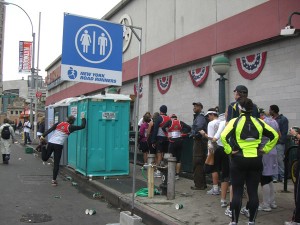
When you gotta go... (Photo by: Jordan Shakeshaft)
More than an hour into his race, Tariq Pasha, 52, dashed to the back of the growing line, ten bodies deep. “It’s okay, I’ll catch up,” the Londoner said. “Some people go on the side of the streets, but we English are a bit more modest,” he added with a laugh.
One competitor, eying her watch, counted more than a dozen runners stretching and shaking out muscles before her. “We’ll lose like five minutes if we stay here,” she calculated. “I hope we can make it to the next one,” she said, jogging off.
– Jordan Shakeshaft
RAISING THE FLAG
LONG ISLAND CITY – Margaret and Angus Hendry of Brooklyn banged a cowbell and waved a large American flag to prod on runners. The couple was on the route’s sidelines to support their daughter Kat Raynour, a first time marathoner, who was running to raise money for the Lupus Foundation.
“It’s just great. She’s been training for a year, her and her husband. He’s a New York City fireman,” Angus said.
“I suffer from Lupus, so it’s personal,” Margaret added, helping her grandsons unfurl a banner that read, “There goes my hero.”
– Margaret Teich
A DIFFERENT DRUM
MOTT HAVEN – The powerful sound of the Japanese taiko drums could be heard for blocks. About 20 members of the New York Taiko Aiko Kai group banged the instruments on the corners of East 138th Street and Canal Street, between miles 20 and 21.
While playing, the drummers yelled “Ganbare!” which means “Don’t give up!” in Japanese.
The drummers aren’t only loud, they’re fun to watch. They move as if they are practicing martial arts.
“Taiko drums were used in Japan to cheer up the Samurai warriors,” noted the group’s leader Kyoto Toyama-Baruah, 51.
– Carla Candia
A MOMENT TO MOURN
HARLEM – They never had been to the world-famous New York Marathon. They came this year, but not to compete in the race or to cheer.
They did not come to dance to the melodious tunes played by live bands, which performed along Fifth Avenue at 138th Street, running south to Mount Morris Park West.
They did not attend to take photographs, record videos of the event or volunteer to hand runners cupfuls of water.
Sisters Kim Walters, Susan Schoen and Cari Melby, and their respective husbands, came from Chicago and Wisconsin in memory of their brother, who collapsed during last year’s race and later died.
Fred Casta, 41, a physical education teacher from Cincinnati, was among three runners felled during the 2008 contest. He collapsed in Harlem and was rushed to nearby Mount Sinai Medical Center where he succumbed 11 days later.
So on Sunday, Casta’s three sisters and their husbands brought flowers and a giant portrait of him as he was dressed for his final race. They positioned themselves opposite the Fifth Avenue home where he was said to have fallen.
“We are still shocked and sad that our brother died that way. But we feel good that he died while doing what he loved,” Kim Walters said. “So, we are here to mourn and honor him.”
–Musikilu Mojeed
A STRONG FINISH
CENTRAL PARK – Jean-Sébastien Lefebvre lost the use of his legs nearly two decades ago, but by mid-morning he already had zipped through each of the five boroughs.
Lefebvre, 40, was the fastest Frenchmen in the handcycle division of the Marathon. Seated and pedaling with his arms, he finished the race in 1 hour, 50 minutes, 32 seconds, coming in 11th
among handcyclists.
“It was stressful – lots of people, lots of music, but it was mythic,” Lefebvre said in French, his gold medallion shining on his chest.
A car accident 18 years ago left Lefebvre a paraplegic. Before the crash, he was an avid runner who competed in 100-meter and 400-meter races.
For ten years after the accident, Lefebvre didn’t play any sports. “It was difficult, psychologically,” he said.
Then, eight years ago, the former airplane mechanic tried using a handcycle and loved it.
Lefebvre, in the city for the first time, said he was a bit disappointed in his performance. “I hoped for a little less time, but the important thing is less than two hours,” he said.
– Andrea Swalec
AFTERMATH: AGONY OF THE FEET
CENTRAL PARK – At 8 a.m. the day after the Marathon, hundreds of runners lined up outside a large tent near Tavern on the Green to collect their medals – and stretch tired muscles. Inside, staff from the Hospital for Special Surgery offered one-on-one recovery sessions.
“People come in with very inflamed tendons and everyone is very tight,” said physical therapist Rob Maschi, 40. “They’ve done more than they’ve ever done before in their lives. Our goal is to get them stretching.”
The majority of injuries suffered by long-distances runners occur in the hip, knee, foot and ankle. A 2007 study by the Stanford University School of Medicine found injury rates as high as 90% in those training for marathons.
Catrin Svensson, 33, a first-time marathoner, warmed up on a stationary bicycle and then, grimacing slightly, launched into hamstring stretches. Despite having knee surgery last year, the New Yorker left her recovery session smiling.
“I’m walking away with new feet!” she called to her trainer. “The pain is gone.”
– Rochana Rapkins
